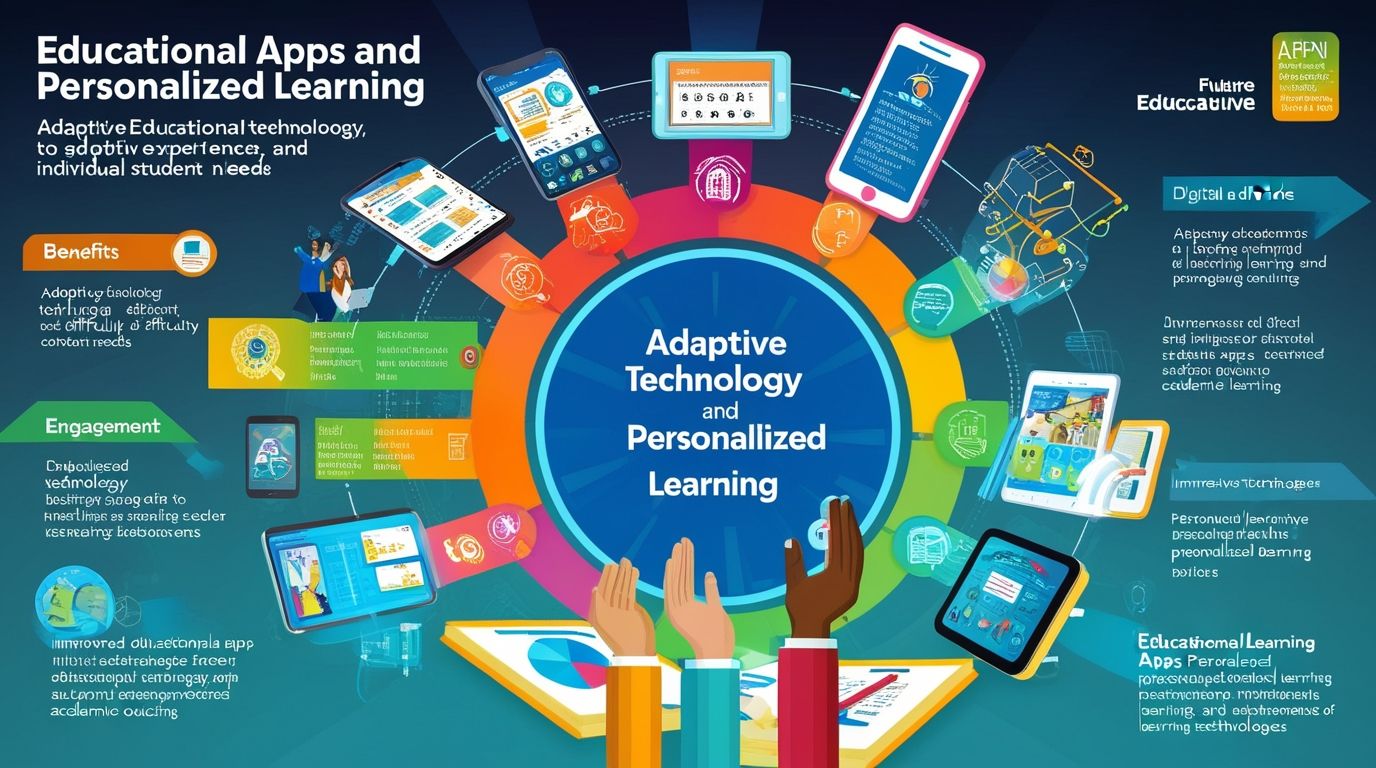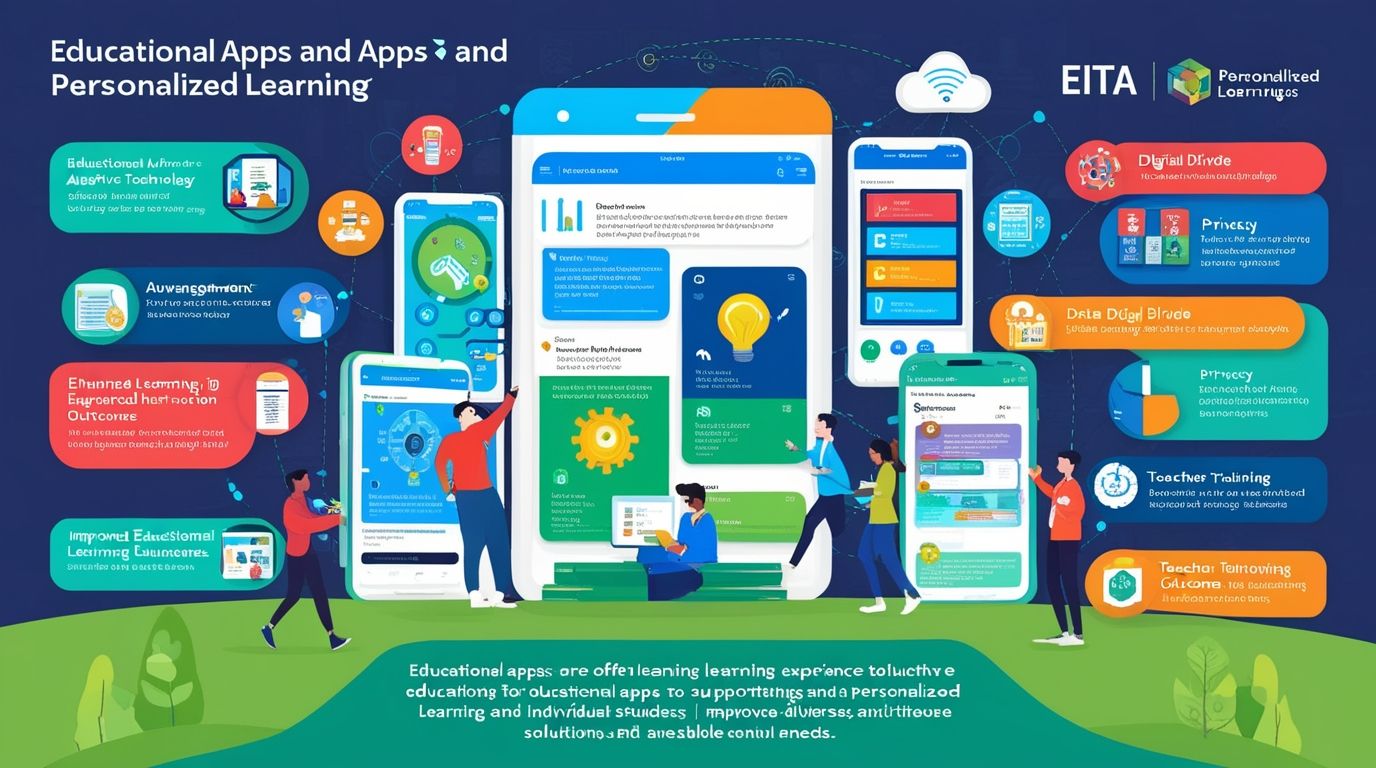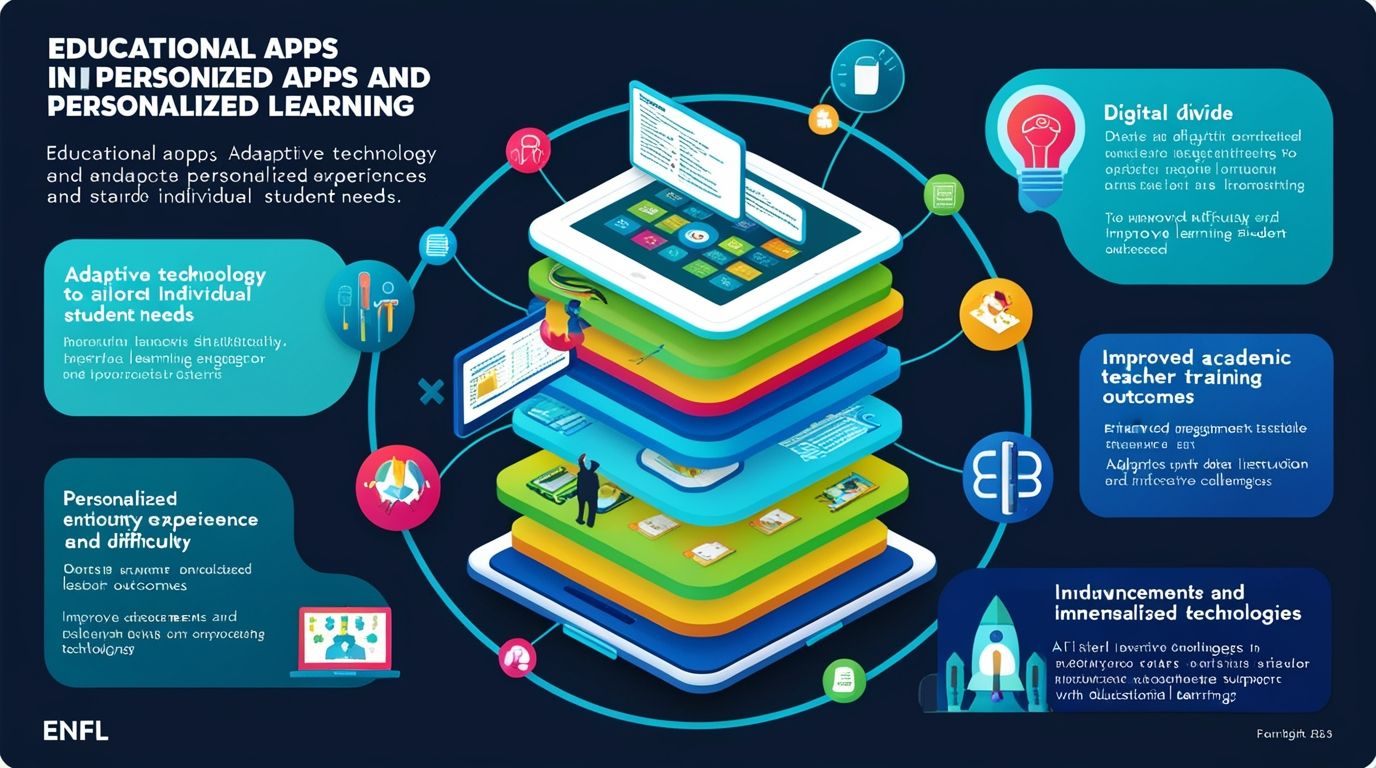Educational Apps and Personalized Learning, the advent of technology has revolutionized the educational landscape, transforming traditional classrooms and learning methods. Among the most significant advancements are educational apps, which facilitate personalized learning. This article explores the role of educational apps in promoting personalized learning, their benefits, challenges, and future prospects.
Understanding Personalized Learning
Personalized learning tailors educational experiences to meet the unique needs, preferences, and learning styles of individual students. Unlike traditional one-size-fits-all approaches, personalized learning recognizes that students learn at different paces and in various ways. Key components of personalized learning include:
- Adaptive Learning: Technology adjusts content and difficulty based on student performance.
- Student-Centered Learning: Focuses on student interests and motivations.
- Flexible Pathways: Allows students to choose how they learn.
- Continuous Assessment: Regular feedback and assessment guide learning progress.

The Role of Educational Apps
Educational apps are software applications designed to support teaching and learning. They range from basic tools for practice and drills to sophisticated platforms offering comprehensive learning experiences. Here’s how educational apps support personalized learning:
- Adaptive Learning Technology: Apps like Khan Academy and Duolingo use algorithms to tailor lessons to individual student needs. These apps assess student performance in real-time, adjusting content and difficulty to match their learning pace and style.
- Interactive and Engaging Content: Educational apps provide interactive and gamified experiences that can increase student engagement and motivation. For instance, apps like Kahoot! and Quizlet make learning fun through quizzes and flashcards, encouraging students to learn actively.
- Accessibility and Flexibility: Educational apps enable learning anytime and anywhere. This flexibility supports personalized learning by allowing students to learn at their own pace and revisit challenging topics as needed.
- Data-Driven Insights: Many educational apps provide analytics and insights into student performance. Teachers and parents can use this data to identify strengths, weaknesses, and areas needing improvement, facilitating targeted support.
Benefits of Educational Apps in Personalized Learning
- Enhanced Engagement: The interactive nature of educational apps keeps students engaged. Gamification elements, such as rewards and leaderboards, motivate students to participate and excel.
- Tailored Instruction: Educational apps provide customized learning experiences. Adaptive learning algorithms adjust content to meet individual student needs, ensuring that each student receives appropriate challenges and support.
- Improved Outcomes: Personalized learning through educational apps has been shown to improve academic outcomes. By addressing individual learning gaps and reinforcing strengths, students can achieve better results.
- Autonomous Learning: Educational apps empower students to take control of their learning. They can choose what, when, and how to learn, fostering independence and self-directed learning skills.
- Accessible Education: Educational apps make learning resources accessible to a wider audience. Students from diverse backgrounds, including those in remote or underserved areas, can access quality educational content.

Challenges and Considerations
While educational apps offer significant benefits, they also present challenges that must be addressed:
- Digital Divide: Not all students have equal access to technology and the internet. This digital divide can exacerbate existing educational inequalities. Ensuring equitable access to devices and connectivity is crucial.
- Quality and Credibility: The vast number of educational apps available makes it difficult to determine their quality and credibility. Educators and parents must carefully select apps that are pedagogically sound and aligned with learning objectives.
- Data Privacy and Security: The use of educational apps involves collecting and storing student data. Protecting this data from breaches and misuse is paramount. Clear policies and regulations regarding data privacy and security are needed.
- Teacher Training and Support: Effective integration of educational apps requires teacher training and support. Educators need to be proficient in using these tools and understanding how to integrate them into their teaching practices.
- Balancing Screen Time: Excessive screen time can have negative effects on students’ health and well-being. It is essential to balance digital learning with offline activities and ensure that screen time is used effectively.
Case Studies
- Khan Academy: Khan Academy offers free online courses, lessons, and practice in various subjects. Its adaptive learning technology personalizes learning experiences, allowing students to learn at their own pace. Teachers can use Khan Academy to assign tasks, track progress, and provide targeted support.
- Duolingo: Duolingo is a language-learning app that uses gamification to make learning languages fun and engaging. Its adaptive learning system personalizes lessons based on user performance, helping learners progress at their own pace.
- DreamBox: DreamBox is a math education app that provides personalized learning experiences for students in kindergarten through eighth grade. Its adaptive engine adjusts lessons in real-time, ensuring that students receive the right level of challenge and support.
- Seesaw: Seesaw is a digital portfolio app that allows students to showcase their work and reflect on their learning. Teachers can provide personalized feedback and assignments, fostering a personalized learning environment.
Future Prospects
The future of educational apps in personalized learning looks promising, with several trends likely to shape the landscape:
- Artificial Intelligence (AI): AI-powered educational apps will become more sophisticated, providing even more personalized and adaptive learning experiences. AI can analyze vast amounts of data to offer tailored recommendations and support.
- Augmented Reality (AR) and Virtual Reality (VR): AR and VR technologies will create immersive learning experiences, enhancing engagement and understanding. These technologies can provide hands-on learning opportunities in subjects like science and history.
- Gamification: The use of gamification in educational apps will continue to grow. Gamified elements can motivate students and make learning enjoyable, promoting sustained engagement.
- Collaboration and Social Learning: Educational apps will increasingly incorporate social learning features, enabling students to collaborate, share knowledge, and learn from peers. This can enhance communication skills and foster a sense of community.
- Lifelong Learning: Educational apps will cater not only to K-12 and higher education but also to lifelong learners. Continuous learning opportunities through apps will support personal and professional growth.
Conclusion
Educational apps play a pivotal role in promoting personalized learning, offering tailored, engaging, and accessible educational experiences. While challenges such as the digital divide, data privacy, and the need for teacher training must be addressed, the benefits of educational apps in enhancing student outcomes are undeniable. As technology continues to advance, educational apps will become even more integral to personalized learning, shaping the future of education and empowering learners worldwide. Through careful selection, implementation, and support, educational apps can transform the learning experience, making education more inclusive, effective, and enjoyable for all students.

Your work has captivated me just as much as it has captivated you. The visual display is elegant, and the written content is impressive. Nevertheless, you seem concerned about the possibility of delivering something that may be viewed as dubious. I agree that you’ll be able to address this issue promptly.
Sportsurge Pretty! This has been a really wonderful post. Many thanks for providing these details.
c3t1a4
kolj8f
bmq5yb
Hmm it looks like your website ate my first comment (it was extremely long) so I guess I’ll just sum it up what I wrote and say, I’m thoroughly enjoying your blog. I too am an aspiring blog blogger but I’m still new to everything. Do you have any tips for first-time blog writers? I’d certainly appreciate it.
fxsl0k
crjmzx
lm60u4
I really like your writing style, good information, thank you for putting up :D. “I hate mankind, for I think myself one of the best of them, and I know how bad I am.” by Joseph Baretti.
Merely wanna remark on few general things, The website style is perfect, the content is really excellent : D.
The other day, while I was at work, my sister stole my apple ipad and tested to see if it can survive a thirty foot drop, just so she can be a youtube sensation. My apple ipad is now broken and she has 83 views. I know this is entirely off topic but I had to share it with someone!
I think other website proprietors should take this site as an model, very clean and fantastic user friendly style and design, let alone the content. You’re an expert in this topic!
https://t.me/s/Official_1win_kanal/1527
https://t.me/s/Webs_1WIN
I’ll immediately grab your rss feed as I can’t find your email subscription link or newsletter service. Do you have any? Kindly let me know in order that I could subscribe. Thanks.
Do you mind if I quote a couple of your articles as long as I provide credit and sources back to your website? My blog is in the exact same niche as yours and my users would truly benefit from some of the information you present here. Please let me know if this ok with you. Appreciate it!
whoah this blog is great i love reading your posts. Keep up the great work! You know, many people are looking around for this information, you can help them greatly.
I adore meeting useful information , this post has got me even more info! .
Some really interesting info , well written and broadly speaking user pleasant.
I feel that is one of the so much important information for me. And i am satisfied studying your article. However want to commentary on few basic things, The web site style is wonderful, the articles is actually great : D. Good job, cheers
Рисунки красоты и здоровья
вдохновляют на уход.
Feel free to visit my website: lincoln university jobs
dltv dota 2 — DLTV — популярный ресурс для просмотра турниров и новостей crenderdevicemgrdx11 dota 2 2.
You made various fine points there. I did a search on the matter and found nearly all folks will have the same opinion with your blog.
Nice read, I just passed this onto a friend who was doing a little research on that. And he just bought me lunch as I found it for him smile Therefore let me rephrase that: Thank you for lunch!
It’s the best time to make some plans for the future and it’s time to be happy. I’ve read this post and if I could I want to suggest you few interesting things or advice. Maybe you could write next articles referring to this article. I wish to read more things about it!